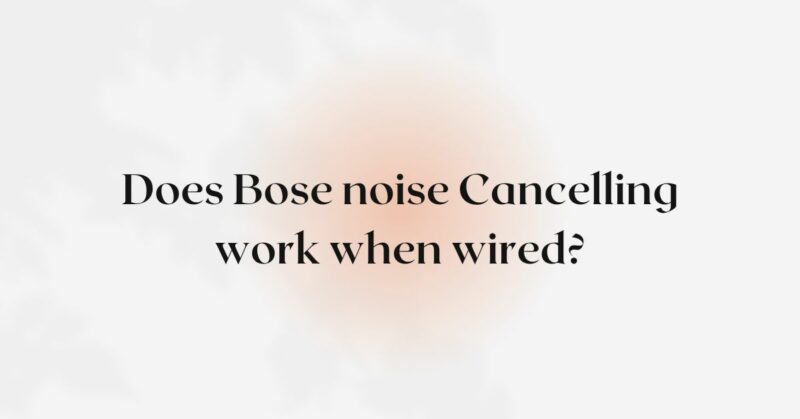Bose is renowned for its exceptional noise cancelling technology, which immerses users in a world of pure sound. While Bose noise cancelling is often associated with wireless functionality, many users wonder if it remains effective when using a wired connection. In this article, we will delve into the functionality of Bose noise cancelling when using a wired connection and explore its effectiveness in providing a tranquil listening experience. By understanding the intricacies of wired connectivity and noise cancelling technology, you can make an informed decision about utilizing Bose noise cancelling with a wired connection.
- Noise Cancelling Technology: An Overview: Bose noise cancelling technology is designed to reduce unwanted external sounds and provide a more immersive listening experience. It works by analyzing ambient noise and generating an equal but opposite sound wave, effectively canceling out the unwanted noise. This technology is highly regarded for its ability to block out distractions, making it a sought-after feature for users seeking a more focused and enjoyable audio experience.
- Wired Connectivity and Noise Cancelling: Bose noise cancelling technology can still be utilized effectively when using a wired connection. When you connect your Bose headphones to an audio source using a wired connection, such as a headphone jack or an audio cable, the noise cancelling feature remains active. The headphones continue to analyze the ambient noise and generate the necessary sound waves to cancel out unwanted sounds, regardless of whether the connection is wired or wireless.
- Benefits of Wired Connection: Using a wired connection with Bose noise cancelling headphones offers several advantages. Firstly, a wired connection ensures a stable and uninterrupted audio signal, resulting in consistent noise cancelling performance. There is no risk of signal interference or audio degradation that can sometimes occur with wireless connections. Additionally, using a wired connection can preserve battery life, as the headphones do not need to rely on wireless technology for audio transmission.
- Power Source and Noise Cancelling: Bose noise cancelling headphones typically require power to operate the noise cancelling feature. In wireless models, this power is supplied by the internal battery. However, when using a wired connection, the power required for noise cancelling is often sourced directly from the audio device to which the headphones are connected. This means that as long as the audio device is providing power, the noise cancelling function will remain operational.
- Noise Cancelling Effectiveness: The effectiveness of Bose noise cancelling when using a wired connection is largely dependent on the quality of the audio source and the headphone model. High-quality audio sources, such as dedicated headphone amplifiers or audio interfaces, can provide a clean and robust signal, enhancing the noise cancelling performance. Additionally, certain Bose headphone models may have specific compatibility requirements or optimizations for wired connectivity, so it is worth checking the user manual or consulting Bose support for any model-specific considerations.
- Passive Noise Isolation: While Bose noise cancelling is highly effective at reducing ambient noise, it is worth noting that using a wired connection alone provides a degree of passive noise isolation. The physical design of over-ear or in-ear headphones helps block out external sounds to some extent. When combined with the active noise cancelling feature, this dual approach can create a truly immersive and isolated listening experience.
- Customizing Noise Cancelling Settings: Some Bose headphone models offer the ability to customize noise cancelling settings using companion apps or physical controls on the headphones themselves. These settings allow you to adjust the level of noise cancelling to suit your preferences and the specific environment in which you are using the headphones. While the wired connection may not directly impact these customization options, it is important to check if your headphone model supports personalized noise cancelling settings and explore the available options.
- User Experience and Preferences: Ultimately, the decision to use Bose noise cancelling headphones with a wired connection depends on personal preferences and specific usage scenarios. While the noise cancelling feature remains effective when using a wired connection, some users may prefer the convenience and mobility of wireless operation. However, for critical listening or situations where a stable and uninterrupted audio connection is essential, using a wired connection can provide peace of mind and consistent performance.
Conclusion: Bose noise cancelling technology is highly effective when using a wired connection, providing users with an immersive and focused listening experience. The noise cancelling feature remains operational, effectively reducing ambient noise and enhancing the audio quality. The use of a wired connection offers stability, uninterrupted audio transmission, and the preservation of battery life. Whether you choose to use your Bose headphones wirelessly or with a wired connection, the noise cancelling technology will continue to deliver its intended benefits, ensuring an enjoyable and uninterrupted audio experience.


